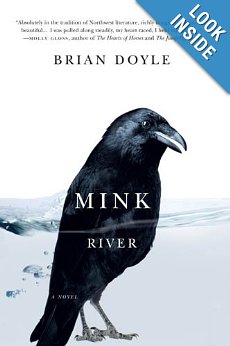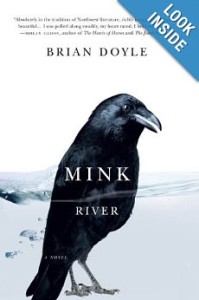Review: Mink River, A Novel, By Brian Doyle
Brian Doyle’s novel Mink River (Oregon State University Press, 2010) is a funny, unique tale that quickly becomes a page turner (once you realize what you are into). Then, story by citizen story, you are transformed from the ground up.
It would be so easy for Doyle to slip into promising what he could never deliver, with a talking crow, Moses; a kind healer, “the doctor,” who takes patients needing extra care into his home overlooking the Pacific; and the several unsung, unusual Irish and native American citizens of the Oregon coast settlement of Neawanaka.
After orienting oneself to the dimension into which one arrives upon commencing reading, one realizes this is another resonance of the world in which we all inhabit, but a kinder, more connected version, and thereby, richer. Doyle fuses the Irish sensitivity for the supernatural with the Northwest First People’s sensitivity for the oneness of creation, into a story whose message is not only in narrative but also form. Tragedies happen, and the village moves to heal, embracing hardship and human flaw. He does not sacrifice plot but allows it to carry one along through the details of the citizens’ daily lives like a canoe shooting the rapids.
But Doyle seeds passages throughout that function like the scintillae of the gnostics, planting the divine into the detail of everyday life. After a bicycle accident in which 12 year old Daniel is horribly injured, his father and grandfather tell him back into existence, a good bit of the body of the book. Doyle writes:
Everyone is kneeling.
For an instant, for a split second, every knee everywhere touches the ground, into the mud, wood, stone, linoleum, water, leaf litter, sand.
… No Horses is on her knees in the woods in the dark by her unconscious son who is face-down his shattered knees wet with blood and mud. …The doctor is on his knees in his closet looking for his mudding boots.…The man who beats his son is on his knees by his bed praying. …His son is on his knees by the dryer in the basement pulling out clothes to fold there is a pile of his folded clothes by his left knee and a pile of his father’s folded clothes by his right knee. …Anna Christie is on her knees in the shallow water at the edge of the river. Her head is bent to touch the river. As the blanket settles onto her mother’s shoulder so do Cyra’s long thin hands like birds landing gently and Cyra’s long thin fingers probe gently tenderly into the tight taut muscles of her mother’s big shoulders to draw out all the screaming there.
The river whirls and sings and Anna rises and sings as she begins to sing all knees rise all at once from the mud the floors the beds the tubs all over… (p. 70-71)
And we too, rise. In the end, Doyle initiates us into a broader experience of community and the meaning of the Lakota we all are relatives. As I finished the last word, I found myself also singing.

